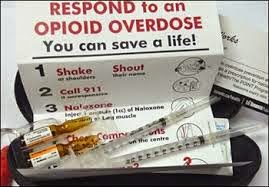Unintentional drug overdose is now considered to
be a leading cause of preventable death in the United States. Administering
naloxone hydrochloride (“naloxone”) can reverse an opioid overdose and prevent
these unintentional deaths.
Naloxone is classified by the U.S. Food and Drug
Administration as a prescription drug, therefore there are laws that govern both
how it may be administered and by whom. In
general, each state creates its own laws about who can prescribe drugs, as well
as what the standards and processes are for prescriptions. In 2013-2014 alone, 20 states passed laws
governing naloxone access. States may allow
legal immunities for both health care professionals and lay persons who
administer the drug. Click here for the Drug Policy Alliance’s map showing which
states have naloxone access laws.
Pennsylvania is one of the states with a
naloxone access law. Opioid Overdose Reversal ACT 139 allows first responders
(law enforcement, fire fighters, EMS), or other organizations acting at the
direction of a health care professional authorized to prescribe naloxone, to
administer the drug to individuals experiencing an opioid overdose. The law also provides immunity from
prosecution for those responding to and reporting overdoses. Additionally,
individuals such as friends or family members in a position to assist a person
at risk of experiencing an opioid related overdose may receive a prescription
for naloxone.
















No comments:
Post a Comment